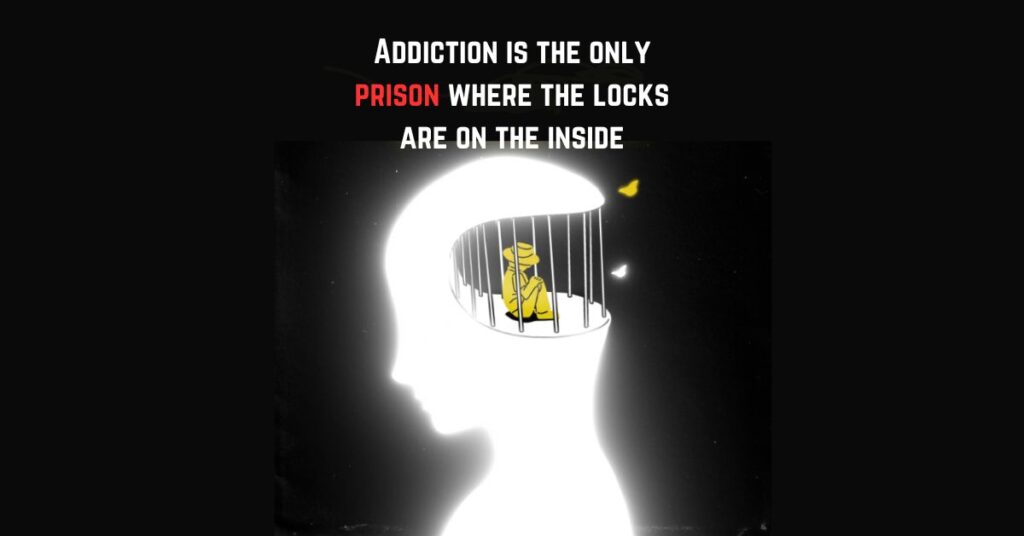Introduction:

Drugs and alcohol exert a powerful influence on the brain’s neurotransmitters. This impact can lead to tolerance, dependence, and intense cravings, making it difficult for individuals to exert personal agency in deciding whether to continue substance use. Scientific studies delve into the intricate ways substances alter brain functioning, highlighting that a person’s control over impulses diminishes when faced with withdrawal symptoms. Acknowledging these neurobiological changes fosters a compassionate understanding of the challenges individuals with addiction face. In the not-so-distant past, addiction was often misunderstood, labeled as a moral failure or character defect. However, the landscape of addiction science has dramatically evolved in recent decades, revealing addiction as a chronic medical illness. This article aims to provide a holistic understanding of addiction, exploring its types, causes, health implications, treatment modalities, and the crucial aspect of prevention and awareness.
Types of Addiction:
Addiction is not a reflection of personal weakness; instead, it is comparable to a chronic medical illness. The intricate interplay of genetic predisposition, environmental factors, and psychological triggers contributes to the complex nature of addiction. In recent years, research has delved into the nuances of addiction types, recognizing the growing concern of poly-substance use.
Substance Addictions:
These are the addictions most people think about, involving substances like drugs and alcohol. Individuals engaging in the simultaneous abuse of multiple substances require tailored treatment approaches for effective recovery. Scientists have studied how these substances mess with our brain chemistry. It’s like they sneak into our brain’s reward system and make it go haywire, leading to intense cravings and dependence. Individuals engaging in the simultaneous abuse of multiple substances require tailored treatment approaches for effective recovery.
Depressants:
- Alcohol: The classic social lubricant, but excessive use can lead to impaired coordination, slurred speech, and more serious health issues.
- Benzodiazepines: Prescription medications like Xanax or Valium, often used to treat anxiety or insomnia. They can be highly addictive.
Stimulants:
- Cocaine: A powerful stimulant that can result in increased energy, focus, and euphoria. It also comes with a crash and potential long-term health issues.
- Amphetamines: Prescription medications like Adderall or illicit drugs like methamphetamine. They stimulate the central nervous system and can lead to increased alertness and energy.
- Nicotine: Found in tobacco products, nicotine is a stimulant that can be addictive.
Hallucinogens:
- LSD, Psilocybin (Magic Mushrooms), DMT: These substances alter perception, mood, and various cognitive processes. They’re not typically considered physically addictive, but their use comes with psychological risks.
Opioids:
- Heroin: A powerful opioid that can cause intense euphoria but also comes with serious health risks, including the risk of overdose.
- Prescription Opioids: Medications like oxycodone, morphine, or fentanyl are prescribed for pain relief but can be misused and lead to addiction.
Cannabis:
- Marijuana: Known for its psychoactive effects, it’s becoming more widely accepted for recreational and medicinal use in various places.
Behavioral Addictions:
You can be addicted to behaviors too, like gambling or excessive internet use. Recent studies show that the brain can get hooked on certain behaviors in a similar way to substances. It’s not about what you take into your body but how certain activities light up the pleasure centers in your brain. Advancements in neuroimaging technologies offer potential for targeted therapeutic interventions by unraveling the neural pathways involved in various types of addiction.
- Gambling Addiction:
Individuals with a gambling addiction find it hard to resist the urge to gamble, even when it causes financial problems. The thrill of risking money and the potential for a win can become addictive.
- Gaming Addiction:
Excessive and compulsive playing of video games, computer games, or online games. This can lead to social, academic, and occupational impairment.
- Internet Addiction:
Spending an excessive amount of time online, often at the expense of real-life activities. This may include compulsive use of social media, online shopping, or other internet-based activities.
- Shopping Addiction (Compulsive Buying Disorder):
A compulsive need to shop and buy items, often resulting in financial problems and emotional distress. The act of shopping itself becomes addictive behavior.
- Exercise Addiction:
Obsessive and compulsive engagement in physical exercise, often to an unhealthy and extreme extent. This can lead to physical injuries, mental health issues, and neglect of other responsibilities.
- Work Addiction (Workaholism):
An obsessive need to work and be productive, often at the expense of personal relationships, health, and leisure activities. The work itself becomes a source of identity and self-worth.
- Food Addiction (Binge Eating Disorder):
Consuming large amounts of food in a short period, often to cope with emotional distress. Individuals with this addiction may feel a lack of control during binge episodes.
- Sexual Addiction:
Compulsive engagement in sexual activities, often leading to negative consequences such as relationship problems, legal issues, or health risks.
- Social Media Addiction:
Excessive use of social media platforms, to the point where it interferes with daily life, relationships, and overall well-being.
Causes of Addiction:
Understanding the causes of addiction involves recognizing the interplay of various factors, each contributing to the complex web that leads individuals down the path of substance or behavioral dependency. Here are key factors that can contribute to the development of addiction
- Genetic Predisposition:
Genetics play a role in addiction vulnerability. Individuals with a family history of addiction may be genetically predisposed to a higher risk. Genetic factors can influence how the body and brain respond to substances, affecting susceptibility to addiction.
- Brain Chemistry and Structure:
Substance use can alter the brain’s chemistry, particularly in areas related to reward and pleasure. Structural changes may occur, reinforcing the cycle of addiction. Altered brain function can lead to increased cravings, diminished impulse control, and a heightened drive to seek out substances or behaviors.
- Environmental Influences:
The environment, including family dynamics, peer influence, and socio-economic factors, can contribute to the likelihood of addiction. Stressful or chaotic environments, exposure to substance use, and lack of positive role models can increase the risk of developing addictive behaviors.
- Early Exposure and Trauma:
Early exposure to substances or traumatic experiences can have lasting effects on an individual’s vulnerability to addiction. Childhood trauma, neglect, or abuse may lead individuals to use substances or engage in addictive behaviors as coping mechanisms.
- Mental Health Disorders:
Co-occurring mental health disorders, such as depression, anxiety, or trauma-related disorders, often coexist with addiction. Individuals may turn to substances or behaviors as a way to self-medicate or alleviate symptoms of mental health issues.
- Peer Pressure and Social Norms:
Pressure to conform, especially during adolescence, can lead individuals to experiment with substances or adopt addictive behaviors.
- Availability and Accessibility:
Easy access to substances or engagement in certain behaviors increases the likelihood of experimentation and development of addiction. Availability and accessibility contribute to the initiation and maintenance of addictive patterns.
- Personality Traits:
Certain personality traits, such as impulsivity, sensation-seeking, or a tendency to seek novelty, can contribute to addiction. Individuals with these traits may be more inclined to engage in risky behaviors, including substance use or addictive activities.
- Neurological Factors:
Individual differences in the structure and functioning of the brain, including areas related to decision-making and impulse control, can influence susceptibility to addiction. Neurological factors can shape an individual’s ability to resist the impulse to engage in addictive behaviors.
- Chronic Stress:
Prolonged exposure to stress can impact the brain’s stress response systems and contribute to the development and maintenance of addiction. Substance use or engagement in addictive behaviors may be used as a means of self-medication to alleviate stress.
Addiction can have a profound and multifaceted impact on mental health. The effects can vary depending on the type of addiction, the severity of the problem, and individual differences. Here are some common ways in which addiction can affect mental health:
- Altered Brain Function: Substance abuse can lead to changes in brain chemistry and function. Many addictive substances affect neurotransmitters, which can disrupt mood, cognition, and behavior.
- Mood Disorders: Addiction is often linked to mood disorders such as depression and anxiety. Substance abuse can temporarily alleviate symptoms, but it often exacerbates these conditions in the long run.
- Increased Risk of Mental Illness: Individuals with substance abuse disorders are at a higher risk of developing mental illnesses. For example, prolonged alcohol or drug abuse may contribute to the onset of conditions like schizophrenia or bipolar disorder.
- Dual Diagnosis: Co-occurring disorders, where addiction coexists with a mental health disorder, are common. These individuals require integrated treatment for both conditions to achieve better outcomes.
- Impaired Cognitive Function: Substance abuse can impair cognitive functions such as attention, memory, and decision-making. This can lead to difficulties in daily life, work, and relationships.
- Social Isolation and Relationship Issues: Addiction often leads to social isolation as individuals may withdraw from friends and family. Relationship issues may arise due to the strain of addiction on personal connections.
- Financial and Legal Problems: The consequences of addiction can extend beyond mental health, affecting one’s financial stability and leading to legal issues. These stressors contribute to a negative impact on mental well-being.
- Increased Risk of Suicide: Individuals struggling with addiction are at a higher risk of suicide. The despair, hopelessness, and isolation associated with addiction can contribute to suicidal thoughts and behaviors.
- Physical Health Complications: Chronic substance abuse can lead to physical health problems, and the interplay between physical and mental health is well-established. Physical health issues can exacerbate mental health symptoms, and vice versa.
- Stigma and Shame: The stigma associated with addiction can lead to feelings of shame and guilt, which further contribute to mental health challenges. These negative emotions may act as barriers to seeking help.
Treatment of Addiction:
It is a comprehensive and individualized process that aims to address the physical, psychological, and social aspects of the disorder. Effective addiction treatment often involves a combination of therapeutic approaches, medications (where applicable), and ongoing support.
- Detoxification (Detox): For substance addiction, detoxification is the initial phase to safely manage withdrawal symptoms as the body eliminates the substance. Detox sets the stage for further treatment but is not a standalone solution. Medical supervision is crucial to manage potential complications.
- Medication-Assisted Treatment (MAT): Medications may be prescribed to assist in the treatment of certain substance use disorders. Examples include methadone or buprenorphine for opioid addiction. MAT can help reduce cravings, prevent relapse, and support the stabilization of the individual.
- Behavioral Therapies: Therapeutic approaches, such as Cognitive-Behavioral Therapy (CBT), motivational interviewing, and contingency management, are employed to address the underlying thoughts, behaviors, and motivations associated with addiction. Behavioral therapies help individuals develop coping skills, identify triggers, and modify patterns of thinking that contribute to addictive behaviors.
- Support Groups: Twelve-Step programs (e.g., Alcoholics Anonymous, Narcotics Anonymous) and non-12-Step alternatives (e.g., SMART Recovery) provide peer support and a structured approach to recovery. Group support fosters a sense of community, shared experiences, and accountability in the recovery journey.
- Dual Diagnosis Treatment: If co-occurring mental health disorders are present, simultaneous treatment for both addiction and mental health issues is essential. Addressing mental health concerns is integral to preventing relapse and promoting overall well-being.
- Family Therapy:Involving the family in therapy can help address dysfunctional dynamics, improve communication, and create a supportive environment for recovery. Family therapy promotes understanding, healing, and a stronger support system for the individual in recovery.
- Relapse Prevention: Relapse prevention strategies focus on identifying triggers, developing coping mechanisms, and creating a personalized plan to navigate challenges. Learning to anticipate and manage triggers is crucial for sustaining long-term recovery.
- Holistic Approaches: Holistic therapies, such as mindfulness, yoga, and art therapy, address the individual’s overall well-being and support the integration of mind, body, and spirit. Holistic approaches contribute to stress reduction, emotional regulation, and a holistic approach to recovery.
- Continuing Care and Aftercare: Ongoing support and aftercare programs, including outpatient counseling, sober living arrangements, and alumni groups, help individuals maintain their recovery in the long term. Continuing care ensures ongoing support, monitoring, and reinforcement of the skills acquired during treatment.
The Reality of Relapse: Setting Reasonable Expectations
Relapse is an ever-present threat in recovery, and addiction treatment education sheds light on the harsh reality of addiction. Setting reasonable expectations is crucial to healing, and understanding the data surrounding addiction treatment helps individuals navigate setbacks with resilience.
Recent developments include research on relapse prevention strategies that focus on identifying and addressing specific risk factors. Personalized interventions, guided by predictive analytics and machine learning algorithms, offer tailored support to individuals at higher risk of relapse. This proactive approach aims to disrupt the cycle of addiction before it escalates, promoting long-term recovery.
As we delve into the reality of relapse, it’s essential to recognize the role of ongoing support systems. Peer support networks, online communities, and telehealth services bridge the gap between formal treatment and everyday life, providing continuous guidance and encouragement.
Acknowledging relapse as a part of the journey, rather than a failure, promotes resilience and encourages individuals to persist in their recovery efforts.
Triggers and Coping Strategies: Navigating the Path to Recovery
Addiction treatment education delves into identifying triggers and coping strategies. Triggers, unique to each individual, can be emotional, environmental, or social factors that stimulate a negative spiral into substance use.
Coping strategies, both quick and extended, aim to confront or distract from triggers, preventing substance use in the heat of the moment and in the long run.
The Communities That Care (CTC) prevention system identifies effective strategies for preventing addiction through community-based interventions.
Educational programs and campaigns, inspired by the Truth Initiative’s tobacco prevention research, demonstrate the impact of targeted initiatives. Dr. Patrick W. Corrigan’s work advocates for destigmatization efforts, enhancing treatment-seeking behavior.
Dr. Leonard Jason’s research emphasizes the role of social support in preventing and overcoming addiction, highlighting the importance of building supportive and understanding communities.
In the digital age, technology-assisted coping strategies are gaining prominence. Mobile applications and virtual reality platforms offer interactive tools for individuals to develop and practice coping skills in real-life scenarios. These innovations not only provide immediate support but also contribute to a comprehensive toolkit for sustained recovery.
Conclusion: A Holistic Approach to Addiction Education
In conclusion, understanding addiction plays a pivotal role in unraveling the complex web of addiction. From understanding the physiological impact to navigating triggers, coping with cravings, and addressing mental health, a comprehensive approach to addiction treatment empowers individuals on their journey to recovery.
By embracing the evolving landscape of addiction science, we can collectively break down stigmas, foster awareness, and pave the way for a brighter, healthier future.
Acknowledging regional nuances, including insights from India-specific studies, enhances our ability to tailor interventions and contribute to a healthier and more resilient society globally.
As we navigate the ever-changing landscape of addiction research, staying abreast of these developments is crucial to crafting holistic and innovative strategies for prevention, treatment, and recovery on a global scale.
In the coming years, the integration of personalized medicine, digital health solutions, and a deeper understanding of the brain’s intricacies will continue to shape the field of addiction science. By embracing a collaborative and multidisciplinary approach, we can usher in a new era of effective, compassionate, and individualized care for those affected by addiction.




